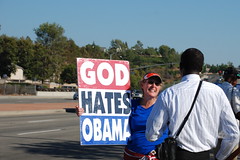Memorial had its digital archives seized in a police raid last month. "This was 20 years' work. We'd been making a universally accessible database with hundreds of thousands of names."
The BBC last week took on the story Dagmaraka started telling here three months ago, picking up roughly where she left off. Rossiya TV, one of Russia’s biggest TV channels, last year launched a show that, over the course of the year, grew into much more than just another TV program: vote for the Greatest Russian in history!
In the first round, no less than fourtyfive million votes were cast for the initial fifty candidates. In the second round for the top 12 vote-getters, another four and a half million votes were phoned or texted in or cast online by the time the vote was concluded last weekend. But there was a problem. Throughout the year, those pesky viewers kept voting Stalin to the top of the list.
Anxious to avoid embarassment, the organisers tried to change the ranking by hook or by crook. The producers appealed to viewers to vote for someone else and, as Dagmaraka recounted, at one point claimed a massive hacking incident to remove one million votes for Stalin. But he kept bouncing right up again.
When the BBC reported the story on Saturday, Stalin was in fourth place. In the final tally, he still passed Pushkin and came in third. He missed the top spot only by a hairwidth: Alexander Nevsky and Pyotr Stolypin beat him by just six and five thousand votes respectively. Lenin didn’t do badly either: he came in sixth, squeezed in between Peter the Great and Dostoyevski.
Now the success of the show in itself is striking. It’s tempting to speculate that it must have something to do with how Russians don’t have many opportunities anymore to vote on a wide-ranging ballot of candidates, but earlier versions of the show in the UK and Holland saw a similar mass participation (and the Dutch version triggered a similar controversy). The BBC report, however, takes the story into a different direction, and places Stalin’s success in the poll in a context of progressive efforts by the Putin-era state to rehabilitate him.
It may be a little all too embarassing to have Stalin right at the top of a list of Russian heroes, but his showing is actually right in line with the state’s recent push to take him out of history’s doghouse:
The primary evidence comes in the form of a new manual for history teachers in the country’s schools, which says Stalin acted “entirely rationally”.
“[The initiative] came from the very top,” says the editor of the manual, historian Alexander Danilov. “I believe it was the idea of former president, now prime minister, Vladimir Putin.”
Continue Reading »



